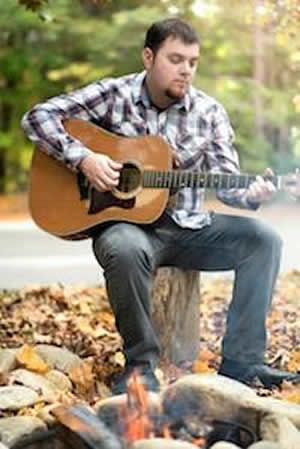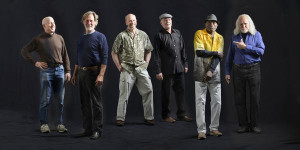
photo credit: Charles Fields
Steve Morgan And The Kingfish have been on a roll lately, a wild roll. In the past year, they’ve won the Cape Cod Talent Search and the Boston Blues Society’s Boston Blues Challenge. Since then, the Cape based blues band has been playing and will keep playing some high profile gig, including a set to open the two day BluesNBrews Festival in Westford, Massachusetts on Saturday, August 20th.
Band leader Steve Morgan played his first gig with his newly created Kingfish on Cape Cod way back in November, 1992. The whole thing happened by happenstance. The owner of the Chatham Sand had asked him if he had a band. Morgan said he did, and so after she booked him he had to put a band together.
“I had just moved here to the Cape from St. Louis,” the blues man said. “What I was trying to do was find people who were playing who interested me.”
Keeping a band together is a difficult matter on the Cape. Many bars shut down for winter, then, during the busy summer season, reopen, and then every musician has got more gigs than he can handle. But, for a variety of reasons, Morgan said, he and the Kingfish have lasted these last 25 years.
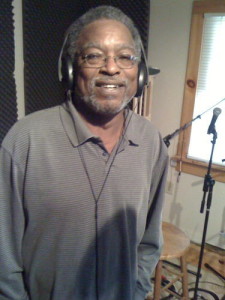
Bryant Edwards; photo credit: Laurie Sullivan
One reason for their longevity is that Morgan had other projects going on. During the mid-1990s Morgan became fed up with bar owners and musicians with substance abuse problems.
“I quit booking for a while and at the same time a friend of mine was kicking off a new band as an experiment, and he asked me to play with him,” Morgan said. “That was Skeeter And The Buzztones which eventually became The Rip It Ups. Then I played with the Provincetown Jug Band for a little while.”
The other reason the Kingfish stayed together was because Morgan had kept on booking periodically and also because the St. Louis trained blues man writes a lot of good songs.
“What I found was after we played the songs, both the musicians and the public really liked the tunes that I wrote. The musicians liked them because they follow unconventional paths but still fall into blues. I think the crowds liked them because Steve Morgan And The Kingfish is a dance band.”
Morgan had gone on to win songwriting contests, gaining some positive recognition from that. The Cape has been a mixed blessing for him. If he hadn’t moved to the Cape he wouldn’t have gone down those unusual songwriting avenues, including a jazzy, island vibe. If he had remained in St. Louis, he likely would’ve stayed with the St. Louis blues style, including a southern rock influence from the white blues-rock musicians down there.
The Cape’s music scene pulled Morgan away from the 12 bar format. Joining the Provincetown Jug Band pushed him into the 32 and 64 bar material, like “Ain’t She Sweet.” Forced to rethink how he played, it opened him to new things. Skeeter, too, pushed him out of his comfort zone, with their emphasis on old rock and roll played on acoustic instruments. Combined with some under utilized knowledge of jazz chords, Morgan took off on many musical adventures.
“That was really a very informative period for me,” he said. “I learned a lot. I spent the years 2007 until now trying to learn how to use these chords the way they should be used and use these jazz chords in a blues context. A Major Seventh chord has a distinctively pretty sound, and you’ll hear it in standards. Blues tends to be a Dominant Seventh chord which is based on a minor scale and has a darker tone. By virtue of learning this stuff, I learned how to combine those two things.”
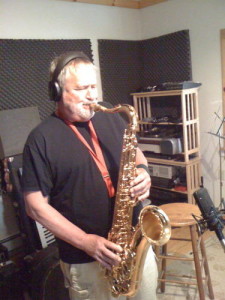
Horn section; photo credit: Tom Tracy
Morgan said he moved to the Cape because he was too comfortable in St. Louis, even though it was one of America’s four major blues cities, which also would include Memphis, Chicago, and Detroit. St. Louis always had and still has a major blues contingent as players from up and down the Mississippi River continuously arrive there.
“Here’s what’s wrong with it,” Morgan said. “It’s too comfortable. I was sitting there, 40 years old, and everything was set. I was becoming an established player on the St. Louis scene. I thought one day I was going to wake up and I was going to be 80 years old, and I was just going to say ‘Boy, have I been comfortable, and I didn’t like the idea of that.”
Morgan’s other problem was that St. Louis often reaches over a hundred degrees in the summer and below zero in the winter. “My feeling about that was: pick one, not both. I hate when I have both.” Cape Cod seemed to be a place he could live, with a lot of educated people living there for him to converse with and a lot of restaurants that would book a musician like him.
Morgan learned his blues in St. Louis and Kansas City first, though. He had met people like slide player Ron Edwards, country blues guitarist Dave MacKenzie, and Doug MacLeod. Morgan described these fellows and others he met back in his home state as “blues scholars.”
“I have been on Cape Cod now for 25 years and I know three people up here who know as much about blues as I did, and everyone else, no, no; not a chance,” Morgan said. “Those three people are names (blues fans) might know. Jerry Portnoy, who played for Eric Clapton and Muddy Waters; or Pierre Beauregard, and a guy named Gary Locke. He’s the guy in Skeeter who stopped me and asked if I wanted to play with him. They’re the only three guys I’ve run into that know the stuff, the history, and the ins and outs as well as I do.”
Morgan maintained he isn’t bragging. He just spent a lot of time working with scholars and meeting players who were passing through St. Louis. “This was back in the 60s where people were playing on a front porch and a back porch and it was amazing stuff,” the blues man said. Dave MacKenzie has given talks about blues at Vanderbilt University. Ron Edwards has had a radio program called Nothing But The Blues, discussing blues for over 30 years on the air.
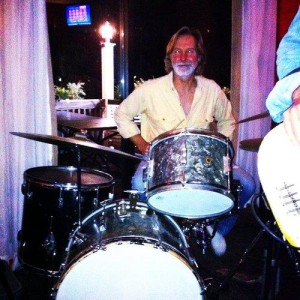
Ed Wanamaker; photo credit: Andy Digger
Morgan has very distinct opinions about blues, especially theories concerning the origins of the genre. He disputes the guitar as the primary instrument, maintaining that black people at the turn of the century and some decades later were playing banjos, not guitars. Morgan also disputes the theory that the Mississippi Delta is the original birth place of the blues. He subscribes to the theory that blues was born in Texas. He said the accordions brought there by Bavarians who wanted to control the territory and the guitar found there later came from the Mexicans. He also said something to the effect that the illegitimate son of Napoleon was established as the only emperor of Mexico and that it was he who had brought in many brass musicians.
“Nobody asked where the accordion came from. Nobody asked where the guitar came from. I did, and I found out it all came from Texas. So, it’s not the Delta,” Morgan said. “I think the terms ‘blues,’ the actual term we use to describe the music, is absolutely, one hundred percent a name cooked up by white people who wanted to sell race records and needed a different word from ‘race.’”
Morgan can talk endlessly about blues, stating things like 12 bar blues, 1-4-5 didn’t exist until WC Handy utilized them. “The most popular blues bands in the 20s and 30s were not the old guy sitting on a porch somewhere wearing overalls playing a beat up National,” he said. “What they were was Bessie Smith and Ma Rainey. This was the golden age of blues, and they had big bands.”
Morgan said that the influential blues player Henry Townsend, now deceased, once told him that before Memphis Minnie came to St. Louis most of the guitar players were playing in an E minor tune. They also tended using to do a lot of patterns. Memphis Minnie came to town and she was playing a lot of single string soloing. People had never seen anything like this before.
“When you talk about the history of the blues it is often subject to a certain amount of inspection and skepticism,” Morgan said. During this interview Morgan disputes the connection between West African music to blues. “The problem is, by the time we started listening to West African music, the West Africans had been listening to American music for 30 years.”
Morgan and his Kingfish recently won The Cape Cod Talent Search and the Boston Blues Society’s Blues Challenge. The Cape Cod victory resulted in gigs at parks, beaches, and gazebos because the organizers of those gigs saw them play and were impressed. Morgan and the band entered the Boston Blues Challenge to announce themselves to bookers and owners in Boston. Club gigs never materialized as a result of the Boston victory, but they were approached by two festival organizers. That resulted in them being booked at New England Blues Summit, North River Blues Festival, and the BluesNBrews Festival.
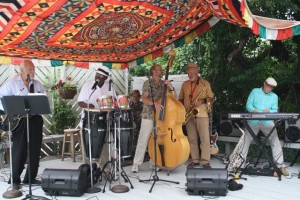
Castle Hills, Truro, MA
“That came from winning the Boston Blues Challenge,” Morgan said. “When we signed up for that, this was strictly with the idea of assuming that there would be a couple of club owners that would be at Johnny D’s(where the Challenge was held) to see who was out there that might be worth hiring and that we would get gigs in Boston as a result. In the real world, as far as I can tell, nearly nobody was there from anywhere(any clubs). But, there were a couple of festival promoters who were there, John Hall, John MacKinnon. They both let us know they’d like to hire us for these kinds of things.”
Being unfamiliar with anybody so north of the Cape, Morgan couldn’t figure out, after he left for the night, which festival promoter was which, as they’re both named John. Morgan and his Kingfish has a special set planned to open the two day BluesNBrews Festival. (Yes, BluesNBrews is now a two day blues festival).
“On anything like this, it will be rare for a cover to make it’s way into the set list unless it is something that for one reason for another we feel it’s a good tune,” Morgan said. “For example, we do ‘Eyes Like A Cat’ which is a Rick Estrin tune. We do that as a closer quite often because we do a good job of it. We have half a dozen songs that do not appear on our CDs, and we’ll definitely be doing those.”
Morgan had many good things to say about his band. Drummer Ed Wanamaker is a solid player, according to Morgan. “He is the one guy out of all of the live recordings we’ve done, he is always the guy who does not make any mistakes. It just kills me. He’s taking it so nice. He’s so uncluttered and right to the point.”
Conga player and second lead vocalist Bryant Edwards, formerly of Avenue X, splits the lead vocal chores with Morgan. “He can really, really sing,” Morgan said. “He does a lot of the soul stuff. He’ll do the Temps tunes or Miracles or anything where we need a wale. He’s a really exceptional singer. Here on the Cape I don’t hear anybody as good as him.” An interesting side note is that Edwards is on dialysis three times a day and is the second longest surviving person on dialysis in the world. “He’s been on it for 31 years. The one who’s been on it the most is 36 years,” Morgan said.
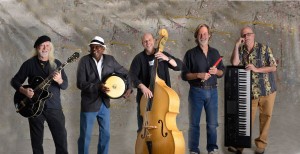
photo credit: Charles Fields
Bassist Roe Osborn is another member of the Kingfish. “Roe is a very talented guy,” Morgan exclaimed. “He’s a professional photographer. He is a sculptor. He’s a very good songwriter. One of his songs just won this year the Jazz category at the Even Tide Arts festival. He plays stand up and electric bass and sings and sings background. He also has a degree in design. He can design houses. He’s an amazing guy.”
Keyboardist Pete Mann joined the Kingfish by showing up, unannounced, at their regular monthly Friday venue at O’Shea’s. “At the far end of the stage there’s a keyboard player, and I’m thinking ‘Who the heck is this guy?’ It turned out he was a friend of Bryant’s. He had invited him up. I didn’t know anything about this guy. I thought “He sounds pretty good.’ He’s been playing with us ever since. He showed up, unasked, unlooked for, and he’s been really great. He does some songwriting. He’s a nice solid piano player.”
The band relies upon a few horn players when they have stage space and a need for a wider sound. Berke McKelvey can play all kinds of saxophones, though he usually plays alto sax, a stritch, and an electric sax. Nicky Suchecki, a student of McKelvey’s at Berklee College Of Music, plays baritone, alto, tenor sax, or flute. Paulie Lesniak from the R&B and jazz schools, plays horns for the band on occasion.
“Those are the guys that I use. The horn players are all exceptional,” Morgan said.
At the two day BluesNBrews Festival, Steve Morgan And The Kingfish will be opening for Joe Louis Walker and Caroline Wonderland. Morgan and his band mates have previously opened for Joe Louis Walker and Caroline Wonderland.
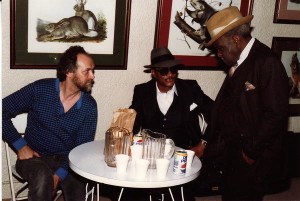
Steve Morgan, in St. Louis, with Hubert Sumlin, Henry Townsend
“Joe Louis Walker does ‘Eyes Like A Cat,” which was where I first heard it. When we opened for him, it was one of the subjects of discussion was ‘Are we closing with ‘Eyes Like A Cat’ because Joe Louis Walker might have it on his list. So, we did something else. He did ‘Eyes Like A Cat.’ I’ve been a fan of Joe Louis Walker’s for a long, long time. I think his first album came out about 1989 or so.”
Being the first band to start up the two day BluesNBrews Festival, Steve Morgan And The Kingfish, Morgan said, plan to leave the audience with something to remember them by.
“Oh, yeah,” Morgan exclaimed. “I know that everybody who’s going to be there is going to be great. They are. Everybody is going to be bringing their A game to something like this, and what they’re going to get out of us is an A game. When you open a show, you have to have a lot of confidence and a lot of power and an ability to ignore the sound people who are just warming up themselves.”
Morgan certainly has the rock solid confidence needed to open for people like Joe Louis Walker and Caroline Wonderland. “I think the material we write is better than probably 90 percent of the stuff I ever hear from anyone. If you think that sounds like bragging, it is.”
With that kind of boast, Morgan and his Kingfish will have to bring their A game everywhere they go. We can only wish them luck in getting their band around to newer audiences.

